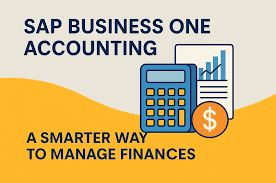In today’s complex business environment, managing accounting and bookkeeping efficiently is critical for success. Companies of all sizes rely on advanced software solutions to streamline financial operations, maintain accuracy, and comply with regulations. One of the leading enterprise resource planning (ERP) platforms, SAP, offers powerful accounting and bookkeeping services that can transform how your business handles its finances.
If you’re wondering what SAP accounting and bookkeeping services are, how they work, and why your business might need them, this complete guide will cover everything you need to know.
What Is SAP?
SAP, which stands for Systems, Applications, and Products in Data Processing, is a global leader in ERP software. Founded in 1972, SAP has developed comprehensive solutions to help businesses manage key operations, including finance, supply chain, human resources, and customer relations, all in one integrated platform.
SAP’s financial modules, especially SAP Financial Accounting (FI) and SAP Controlling (CO), provide the backbone for accounting and bookkeeping services within the system.
Understanding SAP Accounting & Bookkeeping Services
SAP accounting and bookkeeping services refer to the use of SAP’s financial modules to record, process, and manage all financial transactions of a business. These services ensure that financial data is accurate, compliant, and readily available for reporting and decision-making.
Here’s a breakdown of key components:
1. Financial Accounting (FI)
The SAP FI module handles core accounting functions such as:
-
General ledger accounting
-
Accounts payable and receivable
-
Asset accounting
-
Bank accounting
-
Financial closing and reporting
This module records all business transactions that affect the company’s financial status, making it easier to produce compliant financial statements and reports.
2. Controlling (CO)
The Controlling module complements FI by focusing on internal cost tracking and management, helping businesses with:
-
Cost center accounting
-
Profit center accounting
-
Internal orders and project accounting
-
Budgeting and variance analysis
This ensures a business can control costs, analyze profitability, and make strategic decisions.
3. Integration with Other SAP Modules
SAP’s financial modules integrate seamlessly with other modules like Sales & Distribution (SD), Materials Management (MM), and Human Capital Management (HCM), allowing real-time data flow and reducing errors in financial records.
Key Features of SAP Accounting & Bookkeeping Services
When you leverage SAP for accounting and bookkeeping, you gain access to several powerful features that enhance efficiency and accuracy:
Automated Transaction Processing
SAP automates the recording of invoices, payments, receipts, and journal entries, reducing manual data entry and the risk of human error.
Real-Time Financial Reporting
SAP generates instant financial reports, allowing businesses to monitor cash flow, profitability, and financial health anytime.
Multi-Currency and Multi-Language Support
For global companies, SAP supports multiple currencies and languages, enabling consolidated financial reporting across borders.
Compliance and Audit Readiness
SAP maintains detailed audit trails and adheres to international accounting standards (GAAP, IFRS), helping businesses stay compliant and ready for audits.
Scalability and Customization
SAP solutions are scalable to fit small businesses to large enterprises and can be customized to meet specific industry or organizational needs.
Benefits of Using SAP for Accounting & Bookkeeping
1. Improved Accuracy and Transparency
By automating data capture and integrating financial information, SAP minimizes errors and provides clear visibility into financial operations.
2. Enhanced Efficiency
Automation speeds up processes like invoicing and payment reconciliation, freeing up your finance team to focus on strategic tasks.
3. Better Decision Making
With real-time data and comprehensive reporting, business leaders can make informed financial decisions quickly.
4. Regulatory Compliance
SAP helps businesses comply with local and international financial regulations, reducing risk of penalties.
5. Cost Savings
By reducing manual labor and errors, SAP accounting services lower operational costs over time.
Who Should Use SAP Accounting & Bookkeeping Services?
While SAP was originally designed for large enterprises, today it offers flexible solutions suitable for:
-
Small and Medium-sized Businesses (SMBs) looking to grow and scale their financial operations.
-
Multinational corporations that need consolidated reporting across countries.
-
Industry-specific companies such as manufacturing, retail, and healthcare, benefiting from SAP’s customization capabilities.
-
Businesses seeking integration of finance with other departments like supply chain and HR.
How to Implement SAP Accounting & Bookkeeping Services
Step 1: Assess Your Business Needs
Understand your current financial processes, challenges, and goals to determine which SAP modules and features fit best.
Step 2: Choose the Right SAP Solution
SAP offers various products such as SAP S/4HANA, SAP Business One, and SAP Business ByDesign designed for different business sizes and industries.
Step 3: Plan the Implementation
Create a detailed roadmap including timelines, budgets, and resource allocation. Consider working with certified SAP consultants or partners.
Step 4: Data Migration and Integration
Transfer your existing financial data into SAP and integrate it with other business systems.
Step 5: Train Your Team
Provide comprehensive training to ensure your finance team can use SAP effectively.
Step 6: Monitor and Optimize
After going live, continually monitor performance and optimize processes to get the most from your SAP investment.
Challenges to Consider
Implementing SAP accounting and bookkeeping services can be complex and costly, especially for smaller businesses. Common challenges include:
-
Initial setup and customization time
-
Training requirements
-
Ongoing maintenance and updates
-
Need for technical expertise
However, these challenges are often outweighed by the long-term benefits of improved financial management.
Conclusion
SAP accounting and bookkeeping services offer businesses a robust and integrated approach to managing their financial data. By automating processes, ensuring compliance, and providing real-time insights, SAP empowers companies to make better financial decisions and accelerate growth.
Whether you’re a small business aiming to scale or a large enterprise seeking efficiency, understanding and leveraging SAP’s accounting capabilities can transform your financial operations.
If you’re considering SAP for your business, it’s essential to evaluate your specific needs, choose the right solution, and partner with experienced professionals to maximize your investment.







0 Comments